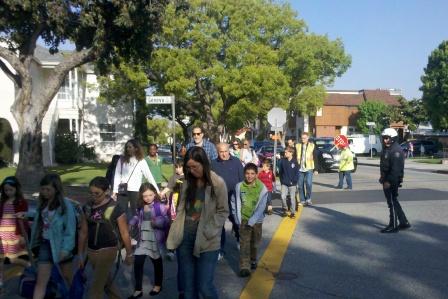
There is a lot to talk about regarding active transportation planning and policies in the Southern California region. Both Southern California Association of Governments (SCAG) and San Diego Association of Governments (SANDAG), our two regional Metropolitan Planning Organizations (MPOs), unanimously passed their Regional Transportation Plans (RTP) and Sustainable Communities Strategies (SCS) with important expansions for active transportation planning. These expansions come on the heels of the anti-sprawl legislation (SB 375), which now requires RTPs to link transportation to land use planning and policies to reduce vehicle miles traveled. Although local advocates still see room for improvements, the wins for active transportation and Safe Routes to School are worth highlighting.
San Diego Association of Governments:
SANDAG’s 2050 RTP provided launching points for important active transportation initiatives. The MPO will develop a regional Complete Streets policy with performance metrics to inform funding decisions and an Activity-Based Model with robust data on bicycle/pedestrian usage. SANDAG proposes data collection efforts to count bicyclists and pedestrians, better understand bicycle/pedestrian travel behavior and capture information about bicycle and pedestrian facilities and safety in the region. It also will ambitiously fast-track or front-load their investments in the next ten years so that the county can reap the benefits of these new investments earlier.
Another part of the new RTP is the Bicycle Plan Early Action Program, which will attempt to build 30 years of bicycle projects in just 10 years. This endeavor requires SANDAG to lead in the development of four class 1 bicycle paths and 30 urban bicycle projects, which were prioritized based on “land use intensities, access to public transit, linkages to activity centers, network deficiencies and safety.” Funding for these projects will come from a variety of sources such as Transnet, TDA Article 3 and Transportation Enhancements (now Transportation Alternatives). Then, in the fall, an Active Transportation Early Action Program will be created to help implement the Safe Routes to School Regional Strategy and programs, Safe Routes to Transit (first mile/last mile) and other active transportation projects.
Southern California Association of Governments:
The public engagement phase of developing the SCAG 2012 – 2035 Regional Transportation Plan and Sustainable Communities Strategies (RTP/SCS) brought active transportation, public health and environmental concerns to the forefront of the discussion. In response, SCAG is creating a new active transportation department and various subcommittees to address these issues, including finding more ways to fund active transportation. At the SCAG Regional Council meeting in June 2012, Hasan Ikhrata, SCAG’s executive director, formally announced the active transportation subcommittee and department:
“During the public hearings for the Draft 2012-2035 RTP/SCS, we heard many testimonies from local citizens and elected officials on the need to increase bike infrastructure investments and improve safety for bicyclists and pedestrians…By creating a formal Active Transportation department, we are shifting roles to implement our landmark long-range plan and better meet the needs of our stakeholders.“
The SCAG reorganization is an effort to align the functions of the departments with the goals in the RTP/SCS. At the July 2012 SCAG Regional Council meeting, its members approved the creation of six subcommittees “to facilitate information exchange and policy development around their respective emphasis areas, identify regional priorities, and help facilitate the implementation of the 2012-2035 RTP/SCS.” (July 2012 agenda) The six subcommittees focus areas are (1) active transportation, (2) goods movement, (3) high-speed rail and transit, (4) public health, (5) transportation finance, and (6) sustainability. These subcommittees will be staffed by interested Regional Council members and have a six-month life span to collect data and make policy recommendations. Their recommendations will be voted on by committees and the larger body of SCAG Regional Council members.

